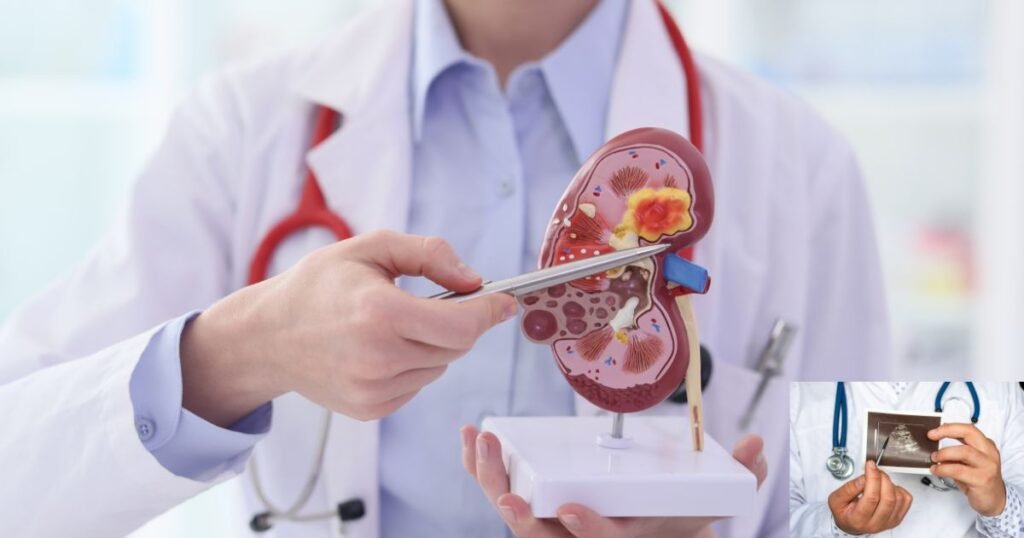Chronic kidney disease (CKD) is the gradual loss of kidney function over time. The kidneys are vital organs that filter wastes and excess fluid from the blood, while retaining needed nutrients. When kidney function declines, dangerous levels of fluid, electrolytes, and wastes can accumulate in the body.
CKD has numerous causes, risk factors, and potential complications. But if detected early, progression can often be slowed or halted with proper treatment and lifestyle changes. Understanding chronic kidney disease is key for prevention and management.
This article provides an overview of chronic kidney disease – what it is, major risk factors, how it’s diagnosed, stages of CKD, treatment options, and steps you can take to protect your kidney health.
Read More: The Kidney Cancer

What Exactly is Chronic Kidney Disease?
Chronic kidney disease refers to permanent, progressive damage to the kidneys that gets worse over months and years. This is in contrast to acute kidney injury, which involves sudden kidney damage that reverses.
With CKD, the kidneys’ filtering units called nephrons are damaged from disorders like high blood pressure, diabetes, or recurrent infections. Nephrons stop working properly, allowing wastes to build up. Healthy kidney tissue is destroyed and replaced with scar tissue over time.
Eventually, CKD can progress to end-stage renal disease (ESRD) and complete kidney failure. This is fatal without dialysis or a kidney transplant. That’s why early detection and treatment aimed at halting CKD progression is so important.
Major Risk Factors for Developing CKD
Certain conditions, genetics, and behaviors raise your risk for chronic kidney disease. Major risk factors include:
- Diabetes – the leading cause of CKD
- High blood pressure
- Heart disease
- Obesity
- Smoking
- Family history of kidney disease
- Kidney stones
- Recurrent UTIs or kidney infections
- Lupus and other autoimmune disorders
- Older age – risk rises as we age
The more risk factors you have, the greater your chances of declining kidney function. Getting ongoing tests to monitor kidney health is important if you are at increased risk.
Stages of Chronic Kidney Disease
Chronic kidney disease progresses through 5 stages based on the glomerular filtration rate (GFR), which measures how efficiently the kidneys filter blood. Higher stages indicate worse kidney function.
Stage 1 – GFR 90+ – Normal function but signs of kidney damage Stage 2 – GFR 60-89 – Mild loss of function Stage 3 – GFR 30-59 – Moderate loss of function Stage 4 – GFR 15-29 – Severe loss of function Stage 5 – GFR <15 – Critical loss/failure
Treatment is aimed at preventing the progression of CKD to later stages and kidney failure. The earlier CKD is detected, the better the outcomes.

Symptoms and Diagnosis
Early stage CKD often has no symptoms, highlighting the importance of testing those at risk. As CKD advances, symptoms like fatigue, decreased appetite, insomnia, itching, muscle cramps, swelling, and bone pain can develop.
Diagnostic tests used to uncover CKD and monitor GFR include blood tests for creatinine levels, urine tests to assess protein loss, and imaging tests to examine the kidneys. A biopsy may also be done. Doctors can then determine the stage and cause of CKD.
Treatment Options for Chronic Kidney Disease
Treatment for chronic kidney disease focuses on slowing the progression and managing complications:
- Controlling underlying conditions – Tightly managing high blood pressure and diabetes to prevent further kidney damage. May require medications.
- Medications – Drugs like ACE inhibitors or ARBs to protect the kidneys. Treatment of anemia and mineral imbalances.
- Dietary changes – Restriction of protein, potassium, sodium, and phosphorus. Increased intake of healthy foods.
- Dialysis – If the kidneys fail completely, dialysis is needed to filter wastes from the blood.
- Kidney transplant – For ESRD, a kidney transplant allows avoidance of long-term dialysis.
Treatment is customized to each patient’s CKD stage, cause, and complications. The earlier it starts, the better.
Protecting Your Kidney Health
You can lower your risk of CKD by:
- Maintaining normal blood pressure and blood sugar
- Eating a healthy diet low in sodium
- Achieving a healthy weight
- Exercising regularly
- Avoiding NSAID overuse
- Staying hydrated
- Not smoking
- Getting regular medical checkups
Chronic kidney disease is serious, but progression can often be delayed or halted when detected and managed early. Monitoring your kidney function is especially important if you have diabetes, hypertension, or other CKD risk factors. Protect your kidney health.
Conclusion
Chronic kidney disease involves the gradual loss of kidney function over time due to conditions like diabetes and hypertension. Early detection through medical screening allows treatment to try to decelerate CKD progression and prevent kidney failure. By controlling underlying conditions and living a healthy lifestyle, you may be able to preserve kidney function and avoid dialysis.

Read More: Chronic kidney disease
Frequently Asked Questions
What are the most common symptoms of chronic kidney disease?
Early stage CKD often has no symptoms. Later symptoms include fatigue, itching, nausea, loss of appetite, insomnia, cramps, swelling of feet and ankles, and feeling cold. Kidney disease is usually detected through screening tests before symptoms appear.
How is chronic kidney disease diagnosed?
CKD is diagnosed through blood tests measuring creatinine levels to estimate the glomerular filtration rate (GFR), and urine tests checking for protein loss. Imaging tests may visualize kidney damage. A biopsy can also be done.
Can chronic kidney disease be cured?
Currently, there is no cure for CKD, only treatments to try to slow progression. But many people with CKD, especially in early stages, can avoid complete kidney failure with proper medical care and lifestyle changes. Kidney transplants can replace failed kidneys.
What food restrictions are needed with chronic kidney disease?
CKD diets limit protein, phosphorus, potassium, and sodium intake. Fluids may need restriction later in kidney disease. Low-salt, low-phosphorus foods like fresh fruits and vegetables, whole grains, lean meats and dairy are encouraged.
Can dialysis reverse kidney damage?
Unfortunately, dialysis cannot reverse CKD or regrow damaged nephrons in the kidneys. It simply filters excess fluid and waste when the kidneys can no longer do so adequately. But without dialysis, complete kidney failure is fatal.






